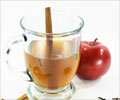An apple a day keeps the doctor away, yes; but researchers say it could also keep brain degenerating disease away as well.
An apple a day keeps the doctor away, yes; but researchers say it could also keep brain degenerating disease away as well. Apple and apple juice were found to boost brain activity in much the same manner as medicines by researchers from the University of Massachusetts Lowell (UML). The animal research found that consuming apple juice might increase the production in the brain of the essential neurotransmitter acetylcholine. This in turn helps memory.
Neurotransmitters such as acetylcholine are chemicals released from nerve cells that transmit messages to other nerve cells. Such communication between nerve cells is vital for good health, not just in the brain, but throughout the body."We anticipate that the day may come when foods like apples, apple juice and other apple products are recommended along with the most popular Alzheimer's medications," says Thomas Shea, Ph.D., director of the UML Center for Cellular Neurobiology and Neurodegeneration Research.
The study will be published in the August issue of the international Journal of Alzheimer's Disease. The abstract is now available online at http://www.j-alz.com/issues/9/vol9-3.html.
The role of acetylcholine in the brain is not a new area of research. Alzheimer's medication studies start with the premise that increasing the amount of acetylcholine in the brain can help to slow mental decline in people with Alzheimer's disease. Testing a similar hypothesis, the UML research team found that having animals consume antioxidant-rich apple juice had a comparable and beneficial effect.
In this novel animal study at UML, adult (9-12 months) and old (2-2.5 years) mice, some specially bred to develop Alzheimer's-like symptoms, were fed three different diets (a standard diet, a nutrient-deficient diet, and a nutrient-deficient diet supplemented with apple components (in this case, apple juice concentrate was added to their drinking water).
Among those fed the apple juice-supplemented diet, the mice showed an increased production of acetylcholine in their brains. Also, after multiple assessments of memory and learning using traditional Y maze tests, researchers found that the mice who consumed the apple juice-supplemented diets performed significantly better on the maze tests.
Advertisement
Earlier studies by Shea's research team had strongly suggested apples must possess a unique mix of antioxidants that improve cognition and memory via inhibition of oxidation in the brain. Those results encouraged Shea to evaluate the neurotransmitter effect, as is done in the current study. Medications given to humans with Alzheimer's disease have been shown to inhibit the production of specific enyzmes (cholinesterase inhibitors) that break down acetylcholine in the brain. The end result in the animal study is similar – there are more of these critical messengers remaining in the brain to enhance memory.
Advertisement
Shea concludes, "The findings of the present study show that consumption of antioxidant-rich foods such as apples and apple juice can help reduce problems associated with memory loss."
Shea also notes that a human clinical study evaluating consumption of apple products will begin in the near future.
Contact: Wendy Davis
[email protected]
U.S. Apple Association
Source: Eurekalert











